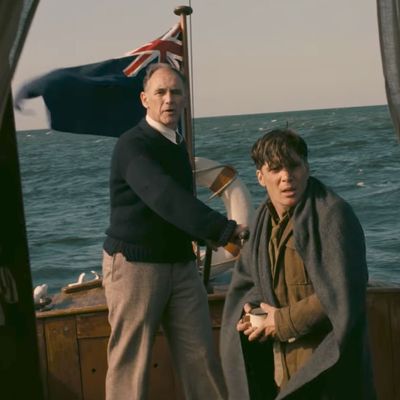
Dunkirk isn’t just the No. 1 movie in America. It’s also, by many viewers’ estimation, the most British summer blockbuster since Notting Hill. How British is it? It’s the cinematic equivalent of putting the kettle on after EastEnders. It’s mushy peas made celluloid. Heck, it’s more British than the Queen, even. (She’s got way more German in her than this movie does.) By the power vested in me by a red passport that I’ve misplaced, here are the most British things about Dunkirk.
It’s about Dunkirk.
Right off the bat, you know Dunkirk was made by a British guy because, well, it’s mostly only British people who know about Dunkirk. If you want proof, I’ll show you the traffic numbers for this post explaining the basics of the movie’s premise. People were hungry for that knowledge.
The queues.
I don’t think it’s an exaggeration to say the first act of Dunkirk is, at heart, a high-stakes drama about proper queue etiquette. The first English words spoken to the our hero Tommy (Fionn Whitehead) are about how he’s in the wrong line, for goodness sake. From there, he’s thrust into any Brit’s most harrowing nightmare: What if the only way you could survive … was by cutting in line? Our Tommy at first tries to bend the unbroken rules of the beach, picking up a stretcher and passing himself off a medic, but he’s forced to undergo the traditional British punishment for line-jumpers: an ordeal of snide glares and cutting remarks. In fact, you could interpret Tommy’s Sisyphean struggle to get home, which is full of multiple sunken boats and tons of explosions, as divine punishment for this most English of original sins.
The tea.
Like many of his countrymen, Christopher Nolan absolutely loves tea. But until now, he was not given the opportunity to fully express that love onscreen. Dunkirk sees him making up for lost time: If there is an opportunity for a scene in this movie to include tea, Christopher Nolan is going to bring the tea. Our boys get picked up by a naval ship? Time for a celebratory cuppa (at least, until the torpedo hits). Cillian Murphy’s shell-shocked soldier needs calming down? Time for a restorative cuppa. The whole hellish ordeal is over? Time for another celebratory cuppa (for real this time). Not that this is an inaccurate: As the Daily Mail wrote in 2014, later in the war, “American and Canadian observers were amazed by the British soldier’s expectation of regular tea and smoke breaks.” They say that like it’s a bad thing.
Michael Caine’s voice.
I can think of few things more British than the voice of south London’s own Maurice Micklewhite, who pops up in Dunkirk as the unseen commander of Tom Hardy’s RAF squadron. Not many people know that.
Mark Rylance.
Similarly, no contemporary actor best reflects the British middle class’s vision of themselves as well as late-period Mark Rylance. Here, he plays a humble middle-aged bloke in a cozy sweater who doesn’t have time for those fancy naval regulations — if his boat needs to be used in the war effort, well then by Jove, he’s going to do it himself. I don’t think Rylance’s character ever physically says the words “mustn’t grumble,” but you know he’s definitely thinking it.
The Elgar on the soundtrack.
Hans Zimmer’s score borrows heavily from Edward Elgar’s “Enigma Variations,” the unofficial anthem of British funerals. (It’s also a puzzle that’s been the subject of a musical guessing game for decades, but that’s more specifically a Nolan thing than a British thing.)
Overestimating the historical importance of “the little ships.”
For almost 80 years, experts have been trying in vain to convince the public that, no, the troops at Dunkirk were not single-handedly saved by a bunch of Sunday sailors spontaneously deciding to take a trip across the Channel. While these boats certainly played their part in the operation, in real life, most of the ships were ferries, merchant marine craft, or lifeboats — and most of them were crewed by the Royal Navy or Merchant Navy. But that’s not as good of a story, so you can forgive Nolan for emphasizing the “little ships,” just as the generations before him had done.
It’s got a Welsh guy playing a Frenchman.
“Eh, they’re both not England, it’s cool.”


